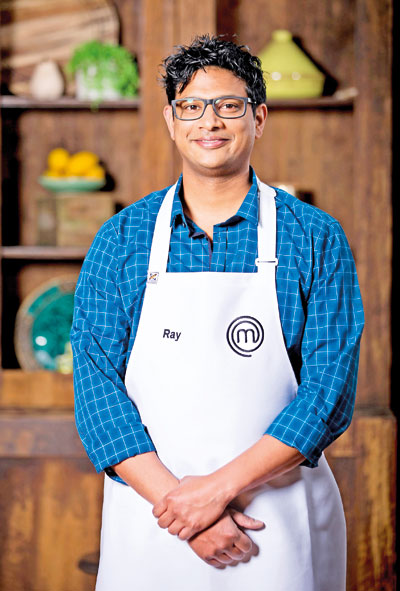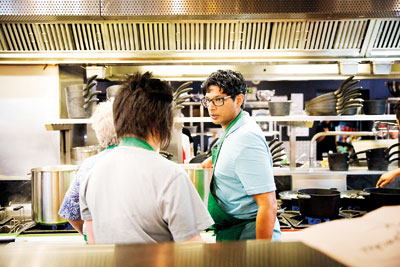Arts
Lankan doc swaps white coat for white apron
Most Masterchef hopefuls walk into their audition nervous, hesitantly explaining what they have made, anxious about the judges’ reaction. Not Ray Silva. He walked in confidently to the Season 9 auditions, announced that he had made bacon and eggs, his tone implying that it was an obvious choice, even in the light of the judges’ questioning looks. As it turns out, he had every reason to be confident – his dish, – a sous vide egg, quinoa, roasted Roman tomatoes, toasted hazelnut, prosciutto and smoked potato foam, earned him an apron mere seconds after the judges tasted it.

Making it to Masterchef’s Season 9: Ray Silva
After switching from training as a surgeon to a general practitioner, Dr. Ray Silva found that he had time on his hands and started cooking. Hosting dinner parties every month for half a dozen people –he impressed guests so much, they suggested he try out for Masterchef Australia, and thus began his journey through one of the world’s most popular cooking competitions.
Most who hear of Ray’s medical background are curious to know how (and why) medicine and cooking can be combined. The combination is clearly a no-brainer for Ray who finds the difference between the two fields quite beneficial. “I feel that medicine is very protocol driven, while cooking is not. There are no hard and fast rules in cooking which I find refreshing,” he explains.
While his choice made perfect sense to him, he had to convince many others that it was the right one – starting with his family. “My mother and sister were very happy but initially my father was hesitant and asked me if I was sure I wanted to mix my medicine with cooking.” Having convinced his father, he then needed to prove himself to the judges. Forty-three-year-old Ray feels that while Gary Mehigan and Matt Preston understood him, George Calombaris was a bit hesitant initially.
“At first he questioned whether I was genuine or not, but later I think he also realized that I was very invested in this,” explains Ray, adding that perhaps George had doubts about his ability to commit to the show being a doctor.
Before reaching the stage which is televised, Masterchef contestants must cook twice, first on a larger scale where the pool of applicants is narrowed down to the hopefuls who cook a second time to get shortlisted for the televised audition. Only 24 of the 50 on the shortlist got aprons, “and they were really good cooks,” says Ray, adding that being chosen from among so many made him feel like he was in a dream. When he got his apron, he was really excited. “I had seen it happen before on TV but I never thought it could be me,” he said. His family shared his excitement, his mother bursting into tears of joy, “the typical Sri Lankan mum’s reaction,” laughs Ray.
His Sri Lankan heritage and childhood experiences are something he has brought with him to his food. Living in Chicago when he was born, his Sri Lankan parents returned home when he was 10 (in 1984), and Ray attended Stafford International School till the age of 15 when the family moved to Australia. Following a bachelor’s degree in science from the University of Wollongong, he obtained his MBBS from the University of Queensland and began training as a doctor. For Ray, his childhood experiences are important to his identity as a chef today.
“I grew up with food – my entire family can cook and I have a lot of good memories which revolve around food,” he says, listing out favourites – the fried chicken and sweet potato pie which reminds him of his early years in Chicago, the fried eggplant (moju) curry and uppuma which his mother made throughout his childhood to the dry aged steak with herb butter and red wine he makes in Australia now.
By focusing more on contemporary food as opposed to Sri Lankan and Asian food, Ray feels he has demonstrated that South Asian cooks can be quite diverse.
“Every year, Masterchef has someone from the South Asian region and they are labelled as being able to do only curries and I wanted to break that stereotype,” he says.. His focus on contemporary food does not lessen his appreciation of Sri Lankan food. “Curries are so flavourful and the average Aussie does not know how to make them, plus it’s definitely a good starting point for food appreciation,” he says, adding that his understanding of complex flavours which stems from his Sri Lankan heritage probably did give him an edge in the competition.
Masterchef Australia contestants undoubtedly need any advantage they can get as the competition is far from easy. Contestants are not allowed any outside contact with the world, apart from as prescribed by the organisers. Unauthorized use mobile phones or accessing the internet is an elimination offence ( In 2011, a contestant Mat Beyer was sent off after he was caught using a mobile phone). Parents see their children for half a day each month, while others have little to no contact with their families. Each week of the competition takes three weeks to film, so it’s a seven month commitment. Contestants have an in-house psychologist, and Ray says the organisers take great pains to ensure their physical and mental wellbeing. When auditioning, prospective contestants are informed of the conditions, but Ray feels that most may not realise how much it entails. “You’re told what the conditions are like, but it’s one thing to hear about them and a completely different thing to actually live through them,” he said, adding that the excitement around the show can often make people disregard the warnings but although difficult initially, it becomes easier and definitely worth the effort.
He has also made many friends with contestants on the show and plans on meeting some and cooking with others in the future.

In the Masterchef kitchen: Ray with fellow contestants. Pix courtesy Endemol Shine Australia 2017
Although complex dishes can be engaging, the simple dishes are also noteworthy, he feels, though his definition of simple might not be the same as that of most.
Pasta for instance, he makes from scratch using flour, salt, eggs and water. “When I’m referring to pasta I do not mean those dry sticks you get in packets at the supermarket,” he laughs. Home-made pasta with olive oil, parsley and garlic is something which he can turn out in less than 10 minutes. As a chef, Ray prefers to make food at home and only ventures out to dine perhaps at a 3 hat restaurant when he wants to eat something which would take him a lot of time and effort to make.
With his two daughters too, instead of taking them out for fast food, he makes burgers, pizza etc. at home occasionally. This helps them appreciate the value of good food, he feels. “When you cook with them they appreciate it more.” In fact, when asked to choose one dish which he loves above all else, the Gnocchi he makes with his daughter Maya every fortnight is his pick.
Coming back to Sri Lanka roughly every five years, Ray plans to revisit soon, this time most probably a food tour with fellow Masterchef contestant and lawyer Benjamin Bullock. “Sri Lanka has amazing produce and food. I feel that our cuisine is not as recognized as other places, which is a shame because we have such great dishes and flavours. We have such good vegetarian options, when I make some Sri Lankan vegetarian curries, people are stunned that they can eat more than just salads,” he says.
Apart from all he has learned from Masterchef, Ray feels that he has also gained just the right amount of recognition –people do recognize him, but not to the point that it becomes overwhelming. “I don’t have throngs of people coming behind me but I do have people who stare at me trying to figure out if I am actually that Ray Silva,” he laughs. Some show their appreciation in thoughtful ways. At his sister’s birthday party at a restaurant recently, food they had not ordered kept appearing – the chefs at the restaurant had recognized him and wanted to show their appreciation of his work. “People appreciate that you appreciate good food,” explains Ray.
His own Masterchef experience has been unbelievable, and he encourages others to also pursue their food dreams – whether it’s becoming a famous chef or to cook for a dinner party. No one should be afraid of cooking or label themselves a bad cook, “it’s just food, it’s not scary,”. Food is all about what tastes good, he feels. “If I put it in my mouth and I like it, then it’s good.” For people looking to start a restaurant, Ray has the same advice. “Don’t be scared, just get in and do it,” he says. He feels that the genuine passion of following one’s dream will help with the hard work needed to succeed.
His own food dream is to open a small restaurant which serves a degustation menu.

